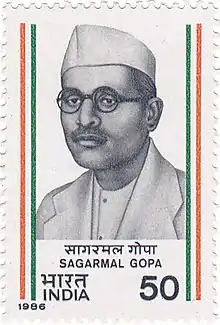Sagarmal Gopa | |
|---|---|
 Sagarmal Gopa on a 1986 stamp of India | |
| Born | 2 November/3 November 1900 |
| Died | 4 April 1946 Prison (location if known) |
| Nationality | Indian |
| Occupation(s) | Freedom fighter, Patriot |
| Known for | Active participation in the Non-cooperation movement, Exposing atrocities of Maharawal Jawahar Singh |
| Notable work | "Jaisalmer ka Gundaraj", "Aajadi ke Diwane", "Raghunath Singh ka Mukadma" |
| Awards | Postage stamp issued by Government of India (1986) |
Sagarmal Gopa (2 November/3 November 1900 – 4 April 1946) was a freedom fighter and patriot from Jaisalmer, Rajasthan, India. His father Akhairaj gopa was a courtier in Maharawal Jawahar Singh's court. Sagarmal Gopa had recorded the atrocities of Jawahar Singh, the contemporary ruler of Jaisalmer, in his book "Jaisalmer ka Gundaraj", after which the enmity between Jawahar Singh and Sagarmal Gopa increased. He took active part in the Non-cooperation movement in 1921. He opposed anti-people policies of then rulers of Jaisalmer. He was expelled from Jaisalmer and Hyderabad. Even in exile he continued to work for freedom movement. After his father's death in 1941, on his return to Jaisalmer he was arrested on 25 May 1941. Sagermal gopa was tortured in prison for years. He was burnt to death in the prison on 4 April 1946. "Gopal Swaroop Pathak commission" was formed to investigate the murder of Sagarmal Gopa, which under the influence of Jawahar Singh, declared this murder as suicide. 3 books were written by gopa 1) aajadi ke diwane 2) jaisalmer ka gundaraj 3) raghunath singh ka mukadma[1]
The Government of India issued a postage stamp in 1986 in honour of Sagarmal Gopa. A branch of Indira Gandhi Canal is named after him.
References
- ↑ K. S. Saxena (1971). The Political Movements and Awakening in Rajasthan: 1857 to 1947. S. Chand.